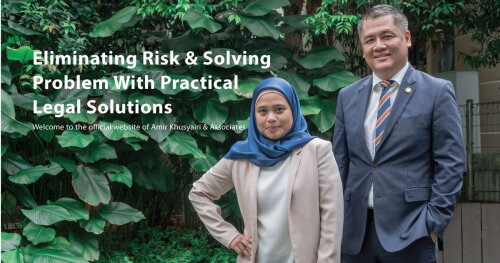Best Energy Regulatory Law Lawyers in Shah Alam
Share your needs with us, get contacted by law firms.
Free. Takes 2 min.
List of the best lawyers in Shah Alam, Malaysia
About Energy Regulatory Law in Shah Alam, Malaysia
Energy Regulatory Law in Shah Alam, Malaysia refers to a complex set of legal rules and policies governing the production, transmission, distribution, and use of energy resources, including electricity, gas, and renewable energy sources. As a state within the central region of Malaysia, the administration of energy laws in Shah Alam is shaped by both federal statutes and state-level regulations. These laws aim to ensure the reliable supply of energy, encourage competition within the sector, safeguard public and environmental interests, and support the nation’s sustainable development goals. Energy regulation is overseen primarily by federal agencies, but local procedures and compliance matters may require specialized knowledge of the region’s unique context and development plans.
Why You May Need a Lawyer
Engaging a lawyer specializing in Energy Regulatory Law in Shah Alam can be crucial for a variety of situations. Common scenarios include:
- Seeking permits or licenses for energy production, renewable energy installations, or distribution ventures
- Ensuring compliance with evolving energy regulations, environmental standards, and safety requirements
- Resolving disputes involving energy contracts, tariffs, or connection agreements
- Participating in government tenders or negotiations related to power purchase agreements
- Navigating land acquisition or land-use issues for energy-related infrastructure
- Responding to regulatory investigations or enforcement actions
- Advising on investment, joint ventures, or mergers and acquisitions in the energy sector
- Advocating for changes to regulatory frameworks or representing stakeholders in public consultations
A qualified lawyer can provide guidance on interpreting technical regulations, representing your interests during dealings with authorities such as Suruhanjaya Tenaga (the Energy Commission), and mitigating legal risks.
Local Laws Overview
Shah Alam, situated in the state of Selangor, is subject to energy regulatory laws primarily enacted at the federal level but with significant local impact. Key legislation and regulatory bodies relevant to the energy sector include:
- Electricity Supply Act 1990 - Governs licensing, supply, and safety in electricity generation and distribution
- Renewable Energy Act 2011 - Provides incentives and regulatory frameworks for renewable energy initiatives, such as solar and biomass projects
- Energy Commission Act 2001 - Establishes the Energy Commission, which oversees compliance, standards, and dispute resolution
- Environmental Quality Act 1974 - Addresses environmental controls for energy operations, emphasizing sustainable development and pollution control
- Local planning regulations by Majlis Bandaraya Shah Alam, which determine land use and grid connection arrangements for energy projects
It is essential for individuals and companies to understand both national legislation and how state or local authorities interpret and administer these rules in Shah Alam, especially as urban development and energy needs evolve.
Frequently Asked Questions
What is the main regulatory body for energy matters in Shah Alam?
The principal regulatory body is the Energy Commission (Suruhanjaya Tenaga), which operates at the federal level and is responsible for licensing, oversight, safety, and standards enforcement within Shah Alam and the rest of Malaysia.
Do I need a license to generate electricity for my own use?
Yes, in most cases, you need a license from the Energy Commission, especially if your generation capacity exceeds the threshold set out in the Electricity Supply Act 1990. Small-scale solar or renewable installations may be eligible for simplified licensing or exemption, but approval is still required.
What permits are required to build an energy facility in Shah Alam?
Permits and approvals are needed from both federal and local authorities. These can include environmental approvals, planning permission from Shah Alam City Council, and operational licenses from the Energy Commission.
Can foreign investors participate in the energy sector in Shah Alam?
Yes, foreign participation is allowed but subject to national policies, limits on ownership in certain sectors, and regulatory approvals. Legal advice is highly recommended to navigate investment rules and licensing requirements.
How are disputes between energy consumers and providers handled?
Disputes are typically resolved through formal complaint procedures with the Energy Commission. For unresolved disputes, parties may resort to mediation, arbitration, or litigation, depending on the nature of the issue.
What incentives are available for renewable energy projects?
Incentives include feed-in tariffs under the Renewable Energy Act 2011, tax exemptions, and grants from agencies like the Sustainable Energy Development Authority (SEDA). Eligibility and application procedures may vary.
Are there special rules for energy efficiency in buildings?
Yes, certain commercial and large residential projects must comply with energy efficiency standards established by the Energy Commission and enforced in building bylaws administered by local authorities such as Majlis Bandaraya Shah Alam.
What happens if I fail to comply with energy regulations?
Non-compliance can result in substantial fines, suspension or revocation of licenses, and even criminal prosecution for serious violations. Prompt legal advice is crucial if you are under investigation or have been issued a non-compliance notice.
Who regulates the tariffs for electricity and gas in Shah Alam?
Tariffs are primarily set and reviewed by the Energy Commission, in consultation with service providers and subject to government policy directives.
How can I check if an energy service provider is properly licensed?
The Energy Commission publishes and maintains lists of licensed operators on request. You can also inquire directly with the agency to verify the licensing status of any provider operating in Shah Alam.
Additional Resources
Individuals and businesses seeking more information or official support on Energy Regulatory Law in Shah Alam can contact or consult the following:
- Energy Commission (Suruhanjaya Tenaga) - The main regulatory authority for energy matters
- Majlis Bandaraya Shah Alam (Shah Alam City Council) - For planning, zoning, and local permits
- Sustainable Energy Development Authority Malaysia (SEDA Malaysia) - For renewable energy incentives and programs
- Malaysian Bar Council - For referrals to qualified energy law practitioners
- Ministry of Energy and Natural Resources (KeTSA) - For overarching policies, guidelines, and updates
- Federation of Malaysian Consumers Associations (FOMCA) - For energy consumer rights and complaints support
Next Steps
If you believe you need legal assistance concerning Energy Regulatory Law in Shah Alam, consider the following steps:
- Identify the specific legal issue, such as licensing, compliance, disputes, or project approvals
- Gather all relevant documents and information, including contracts, permits, correspondences, and any notices received
- Contact a lawyer experienced in energy regulation, ideally with local knowledge in Shah Alam and Selangor
- Consult with the lawyer to discuss your objectives and obtain strategic, tailored advice
- If necessary, your lawyer can represent you before regulatory bodies, assist in negotiations, or handle disputes
- Stay informed of changes in laws and regulations that might affect your project or business
Taking timely and informed legal action is essential to protecting your interests and ensuring full compliance with energy sector regulations in Shah Alam, Malaysia.
Lawzana helps you find the best lawyers and law firms in Shah Alam through a curated and pre-screened list of qualified legal professionals. Our platform offers rankings and detailed profiles of attorneys and law firms, allowing you to compare based on practice areas, including Energy Regulatory Law, experience, and client feedback.
Each profile includes a description of the firm's areas of practice, client reviews, team members and partners, year of establishment, spoken languages, office locations, contact information, social media presence, and any published articles or resources. Most firms on our platform speak English and are experienced in both local and international legal matters.
Get a quote from top-rated law firms in Shah Alam, Malaysia — quickly, securely, and without unnecessary hassle.
Disclaimer:
The information provided on this page is for general informational purposes only and does not constitute legal advice. While we strive to ensure the accuracy and relevance of the content, legal information may change over time, and interpretations of the law can vary. You should always consult with a qualified legal professional for advice specific to your situation.
We disclaim all liability for actions taken or not taken based on the content of this page. If you believe any information is incorrect or outdated, please contact us, and we will review and update it where appropriate.











